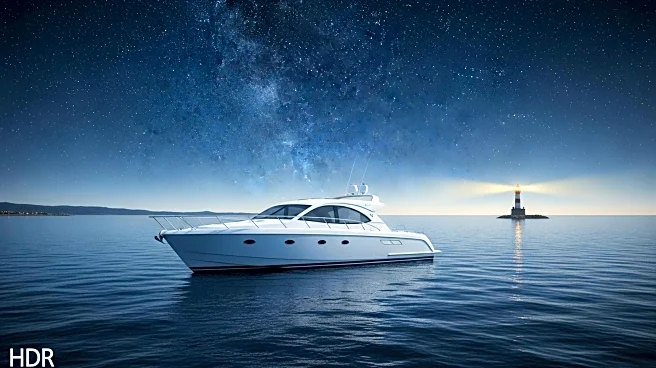What's Happening?
Israeli forces have intercepted the last boat of a 42-vessel flotilla attempting to breach Israel's maritime blockade of Gaza. The flotilla, known as the Global Sumud Flotilla, included approximately 500 participants, among them parliamentarians, lawyers, and activists such as Greta Thunberg. The Polish-flagged sailing boat Marinette was intercepted 42.5 nautical miles from Gaza's coast, marking the closest an unauthorized humanitarian mission has come since the blockade's imposition in 2009. The Israeli foreign ministry has initiated deportation procedures for the participants, estimated at about 450 people. The flotilla's organizers reported that the Marinette joined the mission late due to weather delays, which may have contributed to its proximity to Gaza before interception.
Why It's Important?
The interception of the flotilla highlights ongoing tensions surrounding the Israeli blockade of Gaza, a point of international contention since its establishment. The blockade is intended to prevent arms smuggling into Gaza, but critics argue it exacerbates humanitarian issues in the region. The involvement of high-profile activists and politicians underscores the global attention and controversy surrounding the blockade. The incident may influence international diplomatic relations and discussions on humanitarian access to Gaza. The interception also raises questions about the balance between security measures and humanitarian efforts in conflict zones.
What's Next?
Following the interception, the detained activists are being transported to Israel for deportation. This action may prompt international diplomatic responses, particularly from countries whose citizens were involved. The incident could lead to renewed calls for dialogue on the blockade and its humanitarian implications. Additionally, the event may inspire further activist efforts to challenge the blockade, potentially leading to more confrontations at sea. The Israeli government may face increased scrutiny and pressure from international human rights organizations and foreign governments.
Beyond the Headlines
The interception of the flotilla may have broader implications for international maritime law and the rights of humanitarian missions. The legal and ethical dimensions of enforcing blockades in conflict zones are complex and may be revisited in light of this incident. The participation of diverse international figures in the flotilla reflects a growing global movement advocating for Palestinian rights, which could influence public opinion and policy in various countries. The event also highlights the role of non-state actors in international conflicts and their ability to draw attention to contentious issues.










